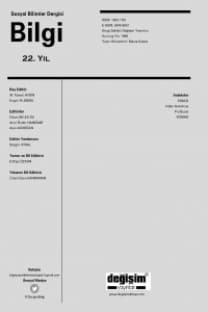28 Şubat Süreci: ‘Post-Modern Darbe’nin Sosyo-Politik Dinamikleri ve Toplum Desteği
Türkiye tarihinde ordu, müdahalesini meşru zeminde gerçekleş- tirmek için toplumda belli bir kesimin desteğine yönelmiştir. Bunu kimi zaman medya aracılığıyla toplumda belli gruplara hitap ederek sağlamıştır kimi zamanda tarihsel olarak kendisini devletin asıl savunucu olarak görmüş ve müdahalesini gerçekleştirmiştir. Bu duruştan hareketle müdahalesini daima meşru gören ordu, gerçek anlamda toplumdan bir destek almış mıdır? Özellikle batı merkezli tarih incelemelerindeki genel kanaat, yapılan tüm değişim ve dönüşümlerin toplum destekli olduğu yöndedir. Türkiye için bunu söyleyebilir miyiz? Modern Türkiye tarihinde dönüşümlerin, “üst bir dayatma” ile gerçekleştiğine inanmış durumdayız. Buradan hareketle, tüm bu sorular ve sorunlar bizi bir mü- dahalenin meşru zeminde yapılıp / yapılmadığı sorunsalını tartışmaya götürmüştür. Burada Modern Türkiye’nin doğuşundan günümüze kadar yapılan radikal değişikliklerin / müdahalelerin tümünü incelenmekten ziyade, sınırlı kalmak amacıyla sadece 28 Şubat müdahalesinin toplumsal zeminde gerçekleşip / gerçekleşmediği irdelenmeye çalışılmıştır.
Anahtar Kelimeler:
28 Şubat Süreci, Post-Modern Darbe, Toplumsal Destek, Meşruiyet
In the history of Turkish, the military tended to seek support from a part of the community in order to make their interference legimate. This was done by speaking to a part of community via media or searing themselves as the real defender of the government and then they made their interference. Seeing what they did as legimate with regard to this condition, did they gain the real support from the community? Particularly, the west-sided history investigations tend to support the idea that the changes and reforms are supported by the community. Is it as such for Turkey? People believe that the reforms in the history of Modern Turkish come to the existence due to the superior interference. For this reason, all of these questions and problems have had us argue whether the interference is made in legitimate condition or not. In this study, to limit the aspects of the investigation, instead of investigating all of the radical changes / interferences in the Modern Turkish history, the interference of “28 February” is investigated with the aspect of whether this investigation was made with community-based purpose or not.
Keywords:
Period of 28th February, Post-Modern Coup, Social Support, Legitimacy,
- ISSN: 1302-1761
- Yayın Aralığı: Yılda 2 Sayı
- Başlangıç: 1999
- Yayıncı: Değişim Yayınları
Sayıdaki Diğer Makaleler
28 Şubat Süreci: ‘Post-Modern Darbe’nin Sosyo-Politik Dinamikleri ve Toplum Desteği
2000 Sonrası Türkiye - Suriye İlişkilerinin Türkiye Dış Ticaretine Yansımaları
Türkiye Solu’nda Gezi Olayı Tartışmaları: Tezler, Karşı Tezler ve Sınırlar
Jean-Jacques Rousseau’nun Doğal Hukuk Anlayışı Üzerine Antropolojik Bir Değerlendirme
